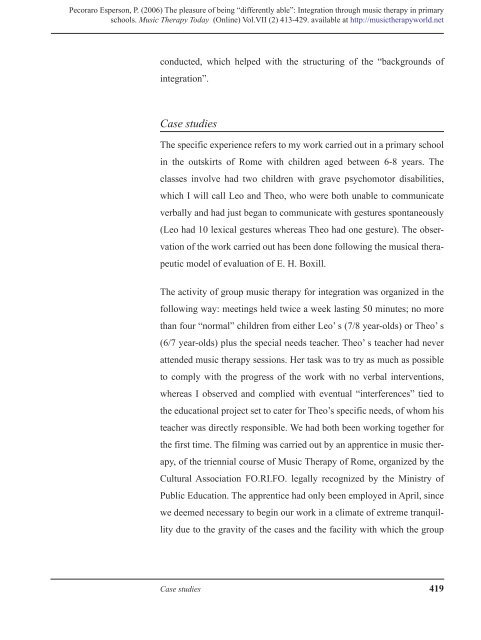Music Therapy Today - World Federation of Music Therapy
Music Therapy Today - World Federation of Music Therapy
Music Therapy Today - World Federation of Music Therapy
You also want an ePaper? Increase the reach of your titles
YUMPU automatically turns print PDFs into web optimized ePapers that Google loves.
Pecoraro Esperson, P. (2006) The pleasure <strong>of</strong> being “differently able”: Integration through music therapy in primary<br />
schools. <strong>Music</strong> <strong>Therapy</strong> <strong>Today</strong> (Online) Vol.VII (2) 413-429. available at http://musictherapyworld.net<br />
conducted, which helped with the structuring <strong>of</strong> the “backgrounds <strong>of</strong><br />
integration”.<br />
Case studies<br />
The specific experience refers to my work carried out in a primary school<br />
in the outskirts <strong>of</strong> Rome with children aged between 6-8 years. The<br />
classes involve had two children with grave psychomotor disabilities,<br />
which I will call Leo and Theo, who were both unable to communicate<br />
verbally and had just began to communicate with gestures spontaneously<br />
(Leo had 10 lexical gestures whereas Theo had one gesture). The obser-<br />
vation <strong>of</strong> the work carried out has been done following the musical thera-<br />
peutic model <strong>of</strong> evaluation <strong>of</strong> E. H. Boxill.<br />
The activity <strong>of</strong> group music therapy for integration was organized in the<br />
following way: meetings held twice a week lasting 50 minutes; no more<br />
than four “normal” children from either Leo’ s (7/8 year-olds) or Theo’ s<br />
(6/7 year-olds) plus the special needs teacher. Theo’ s teacher had never<br />
attended music therapy sessions. Her task was to try as much as possible<br />
to comply with the progress <strong>of</strong> the work with no verbal interventions,<br />
whereas I observed and complied with eventual “interferences” tied to<br />
the educational project set to cater for Theo’s specific needs, <strong>of</strong> whom his<br />
teacher was directly responsible. We had both been working together for<br />
the first time. The filming was carried out by an apprentice in music ther-<br />
apy, <strong>of</strong> the triennial course <strong>of</strong> <strong>Music</strong> <strong>Therapy</strong> <strong>of</strong> Rome, organized by the<br />
Cultural Association FO.RI.FO. legally recognized by the Ministry <strong>of</strong><br />
Public Education. The apprentice had only been employed in April, since<br />
we deemed necessary to begin our work in a climate <strong>of</strong> extreme tranquil-<br />
lity due to the gravity <strong>of</strong> the cases and the facility with which the group<br />
Case studies 419

















